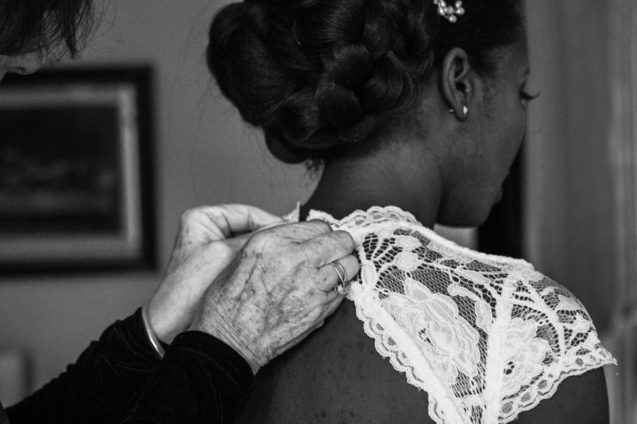Every year thousands of women are trafficked to European cities and put to work having sex with men. Jewel, a young Nigerian who had expected to become a carer, eventually managed to escape thanks to two chance meetings.
"I just saw light. It's very often dark where I come from because there's no electricity… But everything here was just blinking - it was very beautiful."
Jewel - not her real name - is describing her arrival in Denmark.
"I was thanking God for the opportunity to be in this country. I was looking forward to starting work."
Jewel caught a flight from Nigeria thinking she was going to work with old people.
"People who get trafficked go through Libya and usually take buses and boats. But this was so well organised that it wasn't suspicious at all," she says.
The International Organisation for Migration has estimated 80% of Nigerian women travelling overland, then attempting to cross the Mediterranean, are trafficked into the European sex trade. Jewel knew of women who had suffered that fate after making the perilous journey, so when her trip began at Lagos airport, she was reassured.
In Copenhagen, she was met by a Nigerian woman, who took her the following day to Vesterbro, Copenhagen's red light district.
"I was looking around for some sort of hospital," Jewel remembers.
They walked the streets for a while, Jewel being told to take note of her surroundings.
Then the woman dropped a bombshell.
"She said, 'This is where you're going to be working.' I looked round to see if she was pointing at a building I hadn't noticed. But no - she meant where we'd been walking. That's when she told me I was going to be a prostitute, and this was where I'd be hunting for customers. Then the whole of Denmark just crashed down on me…"
Jewel had one fortuitous meeting that night that would later be important - Michelle Mildwater from HopeNow, an NGO supporting trafficked people in Denmark, spotted the tiny, timid, 20-something woman and gave her a card with a contact number on it.
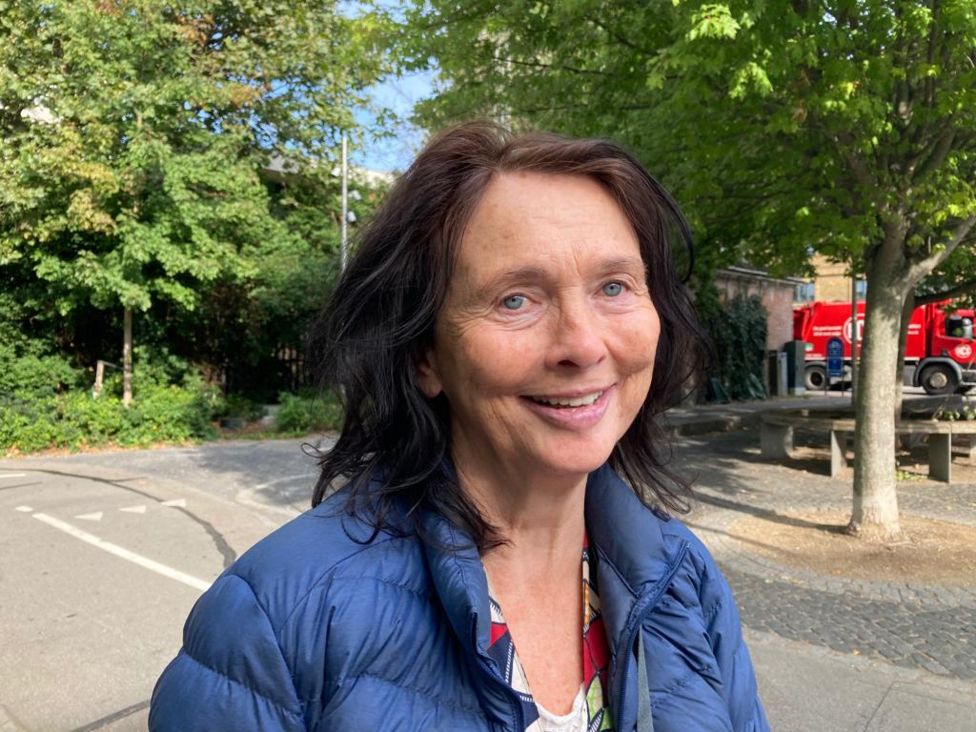
Jewel's Nigerian boss - her "madam" - told her not to trust this English woman with a bike. Then she quickly found Jewel her first customer.
"The man gave her 4,000 kroner (£450 / $620) to take me home, and then my madam just walked away," says Jewel.
"He drove me for what seemed like forever. I didn't speak the language at the time and I had no idea what he was saying - we had to use Google Translate to communicate. It was scary."
In the months that followed, selling sex did not become any easier for Jewel.
"I wasn't good at it. I was that shy one in the corner. But I always got found because the regulars know when a new person arrives, and they wanted a piece of the new person."
In the most recent figures released by the EU, more than 14,000 trafficking victims were registered in 2017/2018 - but this will be the tip of the iceberg, because they represent only identified cases. Half were from outside the EU, with Nigeria one of the top five nationalities.
Sexual exploitation continues to be the main purpose of trafficking, according to the European Commission, and in a single year the criminal revenues derived from it are estimated at a staggering 14bn euros (£12bn / $16bn).
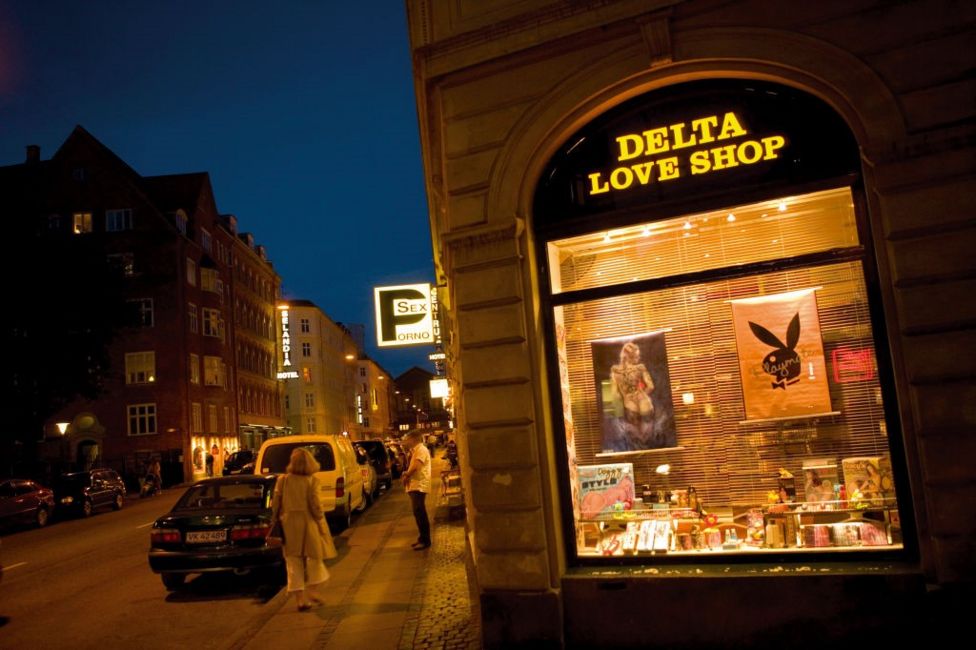
The women who earn this money are told they owe their traffickers huge sums for travel and accommodation.
"They are debt-bonded," says Sine Plambech, a senior researcher in the Department of Migration at the Danish Institute for International Studies.
"Nigerians are one of the migrant sex worker groups with the highest debt. It could be between 10,000 and 60,000 euros. And when you have that kind of debt, you need to make a lot of money fast. And if you don't have papers that allow you to work, the fastest way to earn money is in the sex industry."
Jewel's traffickers said she would have to pay them 42,000 euros, in regular instalments. To underline their point they summoned her to a frightening meeting in a cemetery, the day before she flew out of Nigeria.
"I was forced to take an oath that I was going to pay the money no matter what, and that I was not going to reveal who trafficked me. If I did, so many bad things were going to happen to me and my family."
Once Jewel was in Denmark, the traffickers menaced her family in Nigeria.
"People just came into the house and they wanted my grandmother to talk to me about not having any ideas about reporting them to the police, or not paying the money. So every time I called her, she was always crying on the phone and reminding me that I had made this deal with these people - I had to pay or something would happen to them."
Jewel was under immense pressure so did not feel she could be discriminating about the clients she serviced inside and between parked cars on the streets of Vesterbro, or in their homes.
"You cannot say no. You have to say yes, because there are 10 or 15 other women looking at that same guy wanting to make some money that night," she says.
But going with a customer to his home could be enormously risky.
"I could have died that night I was forced to remain in the bathtub," she remembers, still traumatised.
"The man I had to go home with asked me to get in the bathtub. And I thought, 'OK - he wants me to clean up or something.' Then he went out and came back with two buckets of ice. And he started pouring this ice on me in the bath. And I was in there naked and it's in the middle of winter…"

'Impunity of perpetrators'
In April this year, announcing a new strategy to combat human trafficking, the European Commission admitted that 10 years of efforts to tackle the problem had largely failed.
"The impunity of perpetrators in the EU persists, and the numbers of prosecutions and convictions of traffickers remain low," it said, making trafficking "a low-risk and high-profit crime".
Attempts to reduce demand for the services of exploited victims had also flopped, the Commission added.
The UK government says that in the year to March 2020 police recorded 7,779 modern slavery crimes (including labour exploitation and sexual exploitation), but fewer than 250 people were charged in 2019.
The UK's support services for victims of modern slavery are run by the Salvation Army. It says 610 non-British survivors of sexual exploitation joined its programme in the year to June 2021.

Vesterbro's main street, Istedgade, with its bars, clubs and sex shops, is noisy and brightly lit on a Saturday night. Groups of men, often unsteady on their feet from the effects of alcohol, prowl up and down. The women selling sex - most of them from Nigeria and Eastern Europe, their hair and make-up immaculate - are dressed in figure-hugging, comfy gym gear. They sport trainers you can run in - there are few pairs of high heels, and no stereotypical "sexy" outfits.
Michelle Mildwater, who has supported foreign prostitutes in Denmark for more than a decade, still does the rounds here - giving out her card to women like Jewel, offering help and counselling. She is very aware how perilous street life is, and remembers several violent incidents in one of the district's hotels.
"We had a number of rapes in there," she says. "There were times when a woman ran out with blood all over her."
At weekends, Danish NGOs run services for the women selling sex. One, Reden International, has a café where they can rest, recuperate and get a snack between clients. And in one of the side streets, a group of volunteers host a harm reduction initiative like no other.
It is called the Red Van, because that is what it is - a vehicle with a bed in the back lit by fairy lights, and a ready supply of condoms and wipes. It is a private space where sex workers can bring a client instead of going somewhere potentially unsafe. Throughout the night, a steady stream of women arrive - men in tow - to use the van's facilities, while the volunteers stand a respectful distance away but close enough to hear if a woman is in trouble. It may be used up to 28 times in a four-hour shift.
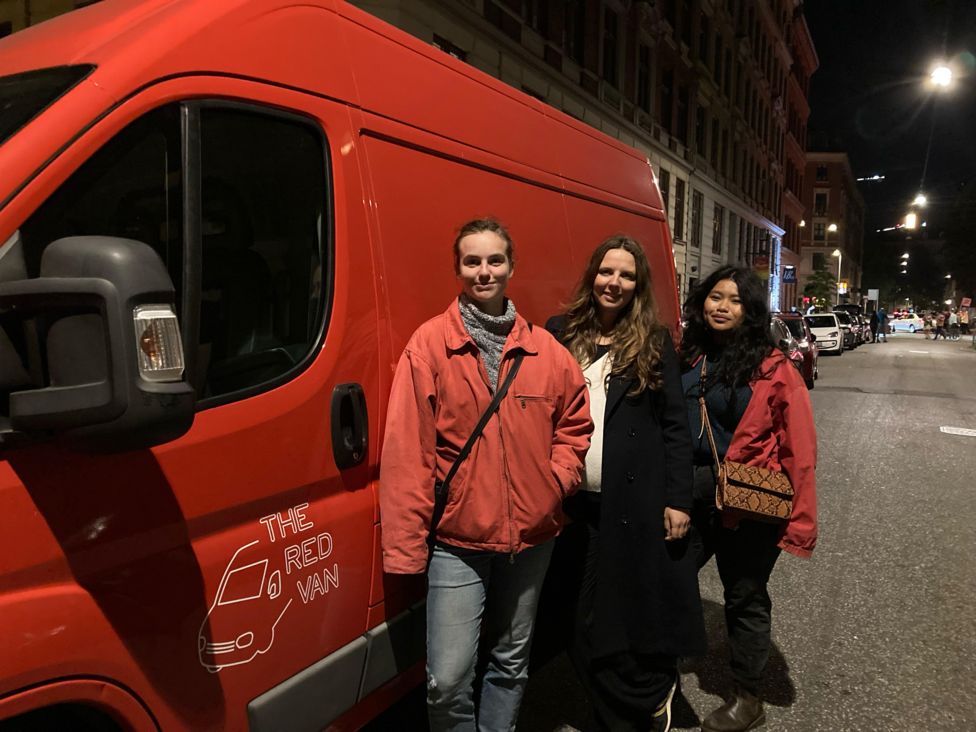
One of the Red Van's volunteers is Sine Plambech, the academic researcher.
"These women have a problem they're trying to solve - debt, poverty, family, children. They need to work. They're going to sell sex whether we like it or not, so we provide a safe space for them while they're doing what they would do anyway," she says.
"Most women wouldn't sell sex if they didn't have to. You can have all these moral ideas about what's good for them, but they need to make money."
Buying and selling sex in Denmark is not illegal, but you do need a work permit. The precarious migration status of many of the women selling sex in Copenhagen makes them more vulnerable - and far less likely to report any abuse or violence against them to the police.
Denmark's policy is to deport irregular migrants. Even if women are identified as victims of human trafficking, they are expected to return to their home countries after a short period in a government-sponsored safe house.
After four months on the streets, desperate, depressed and tempted to take her own life, Jewel too was reluctant to report to the authorities. She still had a massive debt, and was fearful for her safety and that of her family in Nigeria.
Then her life changed. It sounds corny - like a fairytale even - but Jewel met a Danish man and fell in love. On their first date, after a romantic meal, she told him everything.
"That's a burden he's had to carry," she says now about the man who became her husband.
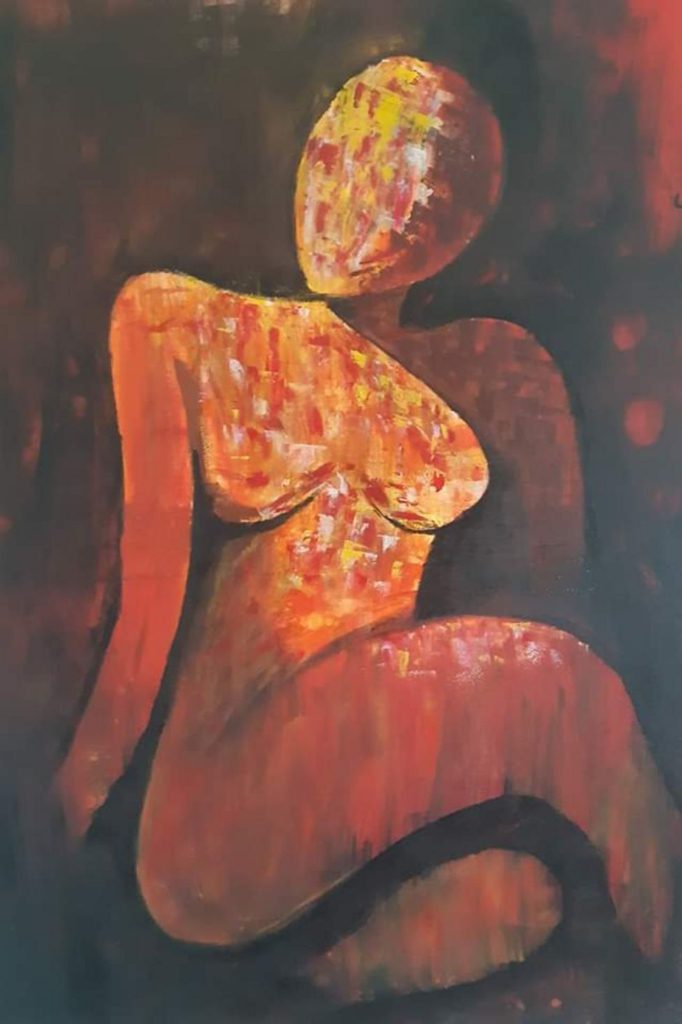
Jewel stopped working on the streets, and he helped her make her weekly repayments to her madam. But the couple needed advice. Did Jewel know anyone who could assist them, her boyfriend asked?
Jewel had kept the card Michelle Mildwater had given her that first night she sold sex in Vesterbro.
Michelle counselled Jewel, helped her to confront her demons, and gave her the confidence to stop paying her madam. And fortunately, there have been no violent repercussions for her or her family - perhaps because her trafficker did not belong to one of the large transnational criminal networks.
Now Jewel is awaiting the outcome of her application to remain in Denmark. Meanwhile, her Danish has become fluent and she has had a baby. Jewel and Michelle have become firm friends. And when Jewel got married, the NGO worker from HopeNow was her Best Woman.
"That's one of the proudest moments of my life - that someone walked me down the aisle, and it was Michelle who did that," says Jewel.
Jewel hopes one day she will go to business school. She also wants to do voluntary work helping women on the streets.
Just before lockdown, Michelle Mildwater, who is a former actor, encouraged Jewel to develop a play - the story of a trafficked woman - and perform it for an audience in Copenhagen. Jewel called it The Only Way Out Is Through.
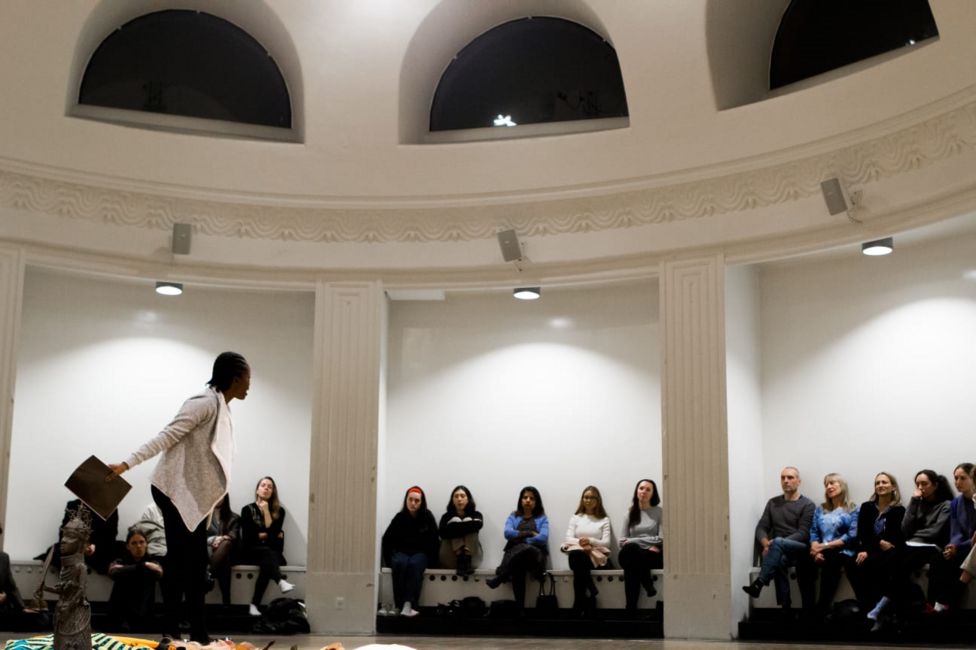
"That was therapy. When I was doing the show I was kind of… out of my body. It was like I was part of the audience, and I was very touched by what I saw," Jewel says.
"Because this is not just a story - this is people's reality."
Latest Stories
-
MeToo founder Tarana Burke defiant after Harvey Weinstein ruling
3 mins -
Be alert, insist on decent messages – Dwumfour tells media
29 mins -
Father jailed 10 years for burning daughter’s genitals with hot cutlasses
39 mins -
I aim to help Ghana produce world-class athletes – Asamoah Gyan
46 mins -
Ashanti Regional Minister alleges sabotage in electricity supply
51 mins -
2024 Elections: Dampare urges Ghanaians to prioritise patriotism and display maturity
59 mins -
‘Let it rot’ campaign hits fish prices in Egypt
1 hour -
Otumfuo chalks 25 years on Golden Stool today
1 hour -
Saudi could get first Miss Universe contestant this year
1 hour -
Ghana Shippers’ Authority initiates steps to sign Service Level Agreements with stakeholders
1 hour -
Fuse ODG supports rising artiste, Fred Kobby, with funds for music video
1 hour -
Mohbad’s toxicology result finally ready
1 hour -
Giggs releases ‘Hallelujah’ video featuring Lojay
2 hours -
Mustapha Ussif wins African Sports Minister of the Year Award.
2 hours -
Sons shouldn’t be mothers’ emotional support system – Ethel Adjololo
2 hours

